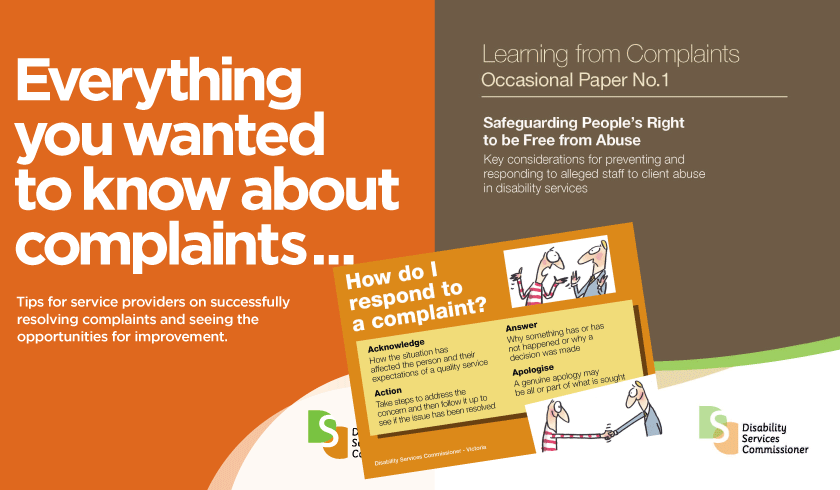Download in PDF (94 KB)
The Disability Services Commissioner (DSC) assesses all complaints and decides whether the complaint can be finalised through early resolution, or is best referred to conciliation or investigation.
What are the first steps in dealing with a complaint?
We assess whether we can handle the complaint. There may be issues that we are unable to handle. When this happens we will try to refer the complaint to the most appropriate place.
If the complaint was made on behalf of a person with disability we will ask whether they are aware of the complaint. We will seek consent to proceed and try and seek their views.
Our focus is on what is important to and for the person receiving the service, and we seek to involve them in the process as much as possible.
How long will it take to assess a complaint?
We need to make sure that we have the relevant information we need to assess the complaint.
Under the Disability Act 2006, assessment may take up to 90 days. The majority of complaints are resolved during the assessment period.
Prompt response to phone calls, emails and letters will help to facilitate this process.
The person making the complaint may withdraw the complaint at any time by telling us.
What happens during the assessment of a complaint?
We work with the person to fully understand the complaint and how it could be resolved. We adapt our process to suit the individual. In most cases, we document the issues and desired outcomes. We will ask for confirmation that these are correct.
We will also talk to the service provider to get their views and may ask them for a written response to the complaint.
We work with both the individual and the service provider to find ways to resolve the complaint. This may involve:
- Acknowledgement: of how the situation has affected the person and their expectations of a quality service;
- Answers: explaining what happened or providing information that may be needed to address the person’s concerns;
- Actions: agreements on steps to address the concerns and improve services;
- Apology: for some people, a genuine apology may be all or part of what is sought.
Resolving complaints nearly always involves finding ways to improve communication.
Where possible, we encourage the individual and the service provider to maintain contact during the complaint process. Keep us informed of discussions and of any changes in circumstances so we know what is happening.
What happens next?
Following the assessment process:
a. The complaint may be resolved during assessment. The majority of complaints are resolved during the assessment stage; or
b. DSC may decide to conciliate the complaint. This is where DSC will try to help the individual and the service provider to reach an agreement about how the complaint can be resolved; or
c. DSC may decide to investigate the complaint; or
d. DSC may decide that we are unable to consider the complaint or that no further action by our office is possible; and/or
e. DSC may decide to provide advice to a service provider or regulatory agency to deal with the issues identified in the complaint.
Sometimes this may include referrals to other relevant agencies.
At the end of the assessment process, we will write to the individual and the service provider about our decision and outline the information that led to this decision.
When is DSC unable to consider a complaint?
DSC is unable to consider a complaint if it is not related to the provision of Victorian disability services by a regulated service provider
This might include complaints about the National Disability Insurance Agency, NDIS funding, plan reviews, Early Childhood Early Intervention services, access to services, employment, health or education services. This might also include matters that have been or will be investigated or determined by another body, court, board or tribunal.
Where possible, we will provide details of other avenues that may assist you with resolving the complaint.
What can I expect from DSC?
You can expect our work to reflect:
Our Values: rights; fairness; respect; and
Our Principles: accessible; person-centred; accountable; responsive; and excellence.
Contact us to make a complaint
Phone (preferred): 1800 677 342 (free call from landlines)
Website: www.odsc.vic.gov.au
Fax: 03 8608 5765
Email: complaints@odsc.vic.gov.au
National Relay Service: www.relayservice.gov.au then 1800 677 342
Please note that DSC collects and uses personal and health information. More information can be found here: https://odsc.vic.gov.au/about-us/privacypolicy/
Download in PDF (94 KB)










